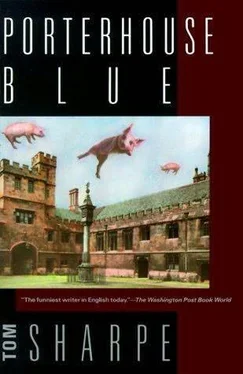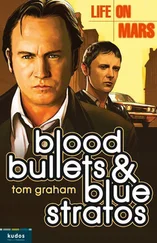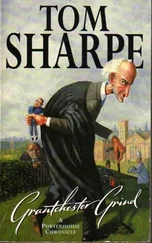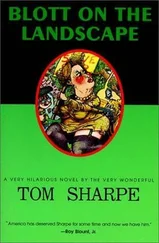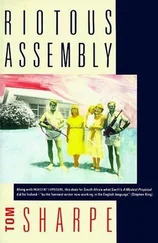Tom Sharpe - Porterhouse Blue
Здесь есть возможность читать онлайн «Tom Sharpe - Porterhouse Blue» весь текст электронной книги совершенно бесплатно (целиком полную версию без сокращений). В некоторых случаях можно слушать аудио, скачать через торрент в формате fb2 и присутствует краткое содержание. Жанр: Современная проза, на английском языке. Описание произведения, (предисловие) а так же отзывы посетителей доступны на портале библиотеки ЛибКат.
- Название:Porterhouse Blue
- Автор:
- Жанр:
- Год:неизвестен
- ISBN:нет данных
- Рейтинг книги:4 / 5. Голосов: 1
-
Избранное:Добавить в избранное
- Отзывы:
-
Ваша оценка:
- 80
- 1
- 2
- 3
- 4
- 5
Porterhouse Blue: краткое содержание, описание и аннотация
Предлагаем к чтению аннотацию, описание, краткое содержание или предисловие (зависит от того, что написал сам автор книги «Porterhouse Blue»). Если вы не нашли необходимую информацию о книге — напишите в комментариях, мы постараемся отыскать её.
Porterhouse Blue — читать онлайн бесплатно полную книгу (весь текст) целиком
Ниже представлен текст книги, разбитый по страницам. Система сохранения места последней прочитанной страницы, позволяет с удобством читать онлайн бесплатно книгу «Porterhouse Blue», без необходимости каждый раз заново искать на чём Вы остановились. Поставьте закладку, и сможете в любой момент перейти на страницу, на которой закончили чтение.
Интервал:
Закладка:
“Forty-five years,” said Skullion and drank his stout.
“Forty-five years,” echoed Carrington. “Remarkable.”
Skullion grunted and lifted a bushy eyebrow. There was nothing remarkable about it to him.
“And now you’ve retired?” Carrington persisted. Skullion sucked his pipe slowly and said nothing. Carrington drank another mouthful of beer, and changed the subject.
“I don’t suppose they have the King Street Run anymore,” he said. “Now that they’ve knocked down so many of the old pubs.”
Skullion nodded. “Used to be fourteen and a pint in every one in half an hour. Took some doing.” He relapsed into silence. Carrington had caught the mood. The old ways were passed and with them the Head Porter. That partially explained the old man’s grim expression but there was something more behind it. Carrington changed his tack.
“The College doesn’t seem to have changed much anyway.”
Skullion’s scowl deepened. “Changed more than you know,” he grunted. “Going to change out of recognition now.” He made a move as if to spit on the floor but turned back and smelt the bowl of his pipe.
“You mean the new Master?” Carrington enquired.
“Him and all the rest of them. Women in college. Self-service canteen in Hall. And what about us as served the College all our lives! Out on the street like dogs.” Skullion drank his beer and banged the glass down on the table. Carrington was silent. He sat still almost invisible with interest like a predator that sees its prey. Skullion lit his pipe and blew smoke.
“Forty-five years I’ve been a porter,” he said presently. “A lifetime, wouldn’t you say?” Carrington nodded solemnly, “I’ve sat in that Lodge and watched the world go by. When I was a boy we used to wait at the Catholic Church for the young gentlemen’s cabs to come by from the station. ‘Carry your bags, sir,’ we’d shout and run beside the horses all the way to the College and carry their trunks up to their rooms for sixpence. That’s how we earned some money in those days. Running a mile and carrying trunks into College. For sixpence.” Skullion smiled at the memory and for a moment it seemed to Carrington that the intensity had gone out of him. But there was something more than mere memory there, a sense of wrong that Carrington could sense and which in a remote way matched his own feelings. And his own feelings? It was difficult to define them, to say precisely what it was that he had found so monstrous in the Dean’s delicate contempt. Except an insufferable arrogance that viewed him distantly as if he had been a microbe squirming convulsively upon a slide. Carrington acknowledged his own infirmity of spirit but his anger remained. He turned to Skullion as to an ally.
“And now they’ve turned you out?” he asked.
“Who said they had?” Skullion asked belligerently. Carrington prevaricated. “I thought you said something about being made redundant,” he murmured.
“Got no right to do it,” he said almost to himself. “They wouldn’t have done it in the old days.”
“I seem to remember in my day that the College had rather a good reputation among the servants.”
Skullion looked at him with new respect. “Yes, sir,” he said, “Porterhouse was known for its fairness.”
“That’s what I thought,” said Carrington, adopting the lordly manner which was evidently what Skullion required of him.
“Old Lord Wurford wouldn’t have dreamt of turning the Head Porter into the streets,” Skullion continued. “When he died he left me a thousand pounds. Offered it to the Bursar, I did, to help the College out. Turned me down. Would you believe it? Turned my offer down.”
“You offered him a thousand pounds to help the College out?” Carrington asked.
Skullion nodded. “I did that. ‘Oh no,’ he says, ‘wouldn’t dream of taking it’ and the next second he gives me notice. It’s not credible is it?”
To Carrington credibility hardly mattered. The story was enough.
“They’re selling Rhyder Street too,” Skullion went on.
“Rhyder Street?”
“Where all the College servants live. Turning us all out.”
“Turning you out? They can’t do that.”
“They are,” Skullion said. “Chef, the head gardener, Arthur, all of us.”
Carrington finished his beer and bought two more. He had the human touch he had been seeking and with it the knowledge that his visit had not been wasted after all. He had his story now.
Chapter 15
The Dean smiled. He had enjoyed his tea with Carrington. It was seldom nowadays that he had the opportunity to put his gifts for malice to good use. “Nothing like a goad for making a man prove himself,” he thought, recalling his happy days as coach to the Porterhouse crew, and the insults he had used to drive the Eight to victory. And Carrington had suffered the gibes in silence. They would fester in him and give him the edge that was needed. He would do the programme on Porterhouse. His coming to Cambridge had proved his interest in the College in spite of his refusal of Sir Cathcart’s invitation. And that refusal was an advantage too. Nobody could say now that he had been put up to it. As for the content of the programme, the Dean felt secure in the knowledge that Carrington was the high priest of nostalgia. Sir Godber’s plans would be the bait. Tradition sullied. The old and proven ways under threat. The curse of modernism. The Dean could hear the clichés now, rolling off Carrington’s tongue to stir the millions hungry for the good old days. And what of Sir Godber himself? Carrington would make mincemeat of the man’s pretensions. The Dean helped himself to sherry with the air of a man well content, if not with the world, at least with that corner of it over which he was guardian. He went down to dinner in high spirits. They were having Caneton à l’orange and the Dean was fond of duck. He entered the Combination Room and was surprised to find the Master already there talking to the Senior Tutor. The Dean had forgotten that Sir Godber dined in Hall occasionally.
“Good evening. Master,” he said.
“Good evening. Dean,” Sir Godber replied. “I have just been discussing this business of the restoration fund with the Senior Tutor. It seems that we’ve had an offer for Rhyder Street from Mercantile Properties. They’ve offered one hundred and fifty thousand. I must say I’m inclined to accept. What’s your opinion?”
The Dean grasped his gown and frowned. His objections to the sale of Rhyder Street were tactical. He opposed what Sir Godber proposed on principle but now it was useful that the Master should commit himself to an act whose lack of charity Cornelius Carrington could emphasize.
“Opinion? Opinion?” he said finally. “I have no opinions on the matter. I regard the sale of Rhyder Street as a betrayal of our trust to the College servants. That is not an opinion. It is a matter of fact.”
“Ah well,” said Sir Godber, “we shall just have to differ, won’t we?”
The Senior Tutor was conciliatory. “It’s a hard decision to make. I do see that,” he said. “On the one hand the servants have to be considered and on the other there is no doubt that the restoration fund needs the money. A difficult decision.”
“Not one that I apparently am called to make,” said the Dean. They trooped into Hall and in the absence of the Chaplain, whose deafness had in no way improved since the explosion in the tower, the Dean said grace. They ate in silence for a while, Sir Godber munching his duck and congratulating himself on the change in the Senior Tutor’s attitude, due possibly to the poor showing of the College in the Bumps, and one or two unfortunate remarks by the Dean. Eager to exploit the rift, Sir Godber set out to cultivate the Senior Tutor. He passed the salt without being asked for it. He told two amusing stories about the Prime Minister’s secretary and finally, when the Senior Tutor ventured the opinion that he thought such goings-on were due to the entry into the Common Market, launched into a detailed account of an interview he had once had with De Gaulle. Throughout it all the Dean remained patently uninterested, his eyes fixed on tables where the undergraduates sat talking noisily, and his mind entertained by the fuse that had been lit in Cornelius Carrington. Towards the end of the meal the Master, having exhausted the eccentricities of De Gaulle, turned the monologue to matters nearer home.
Читать дальшеИнтервал:
Закладка:
Похожие книги на «Porterhouse Blue»
Представляем Вашему вниманию похожие книги на «Porterhouse Blue» списком для выбора. Мы отобрали схожую по названию и смыслу литературу в надежде предоставить читателям больше вариантов отыскать новые, интересные, ещё непрочитанные произведения.
Обсуждение, отзывы о книге «Porterhouse Blue» и просто собственные мнения читателей. Оставьте ваши комментарии, напишите, что Вы думаете о произведении, его смысле или главных героях. Укажите что конкретно понравилось, а что нет, и почему Вы так считаете.
